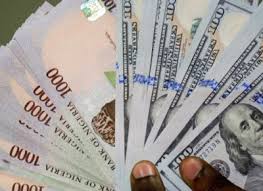Naira Relapses, Down Sharply to N1105/$ at Official FX Market

It was surprising yesterday to see the Nigerian currency, Naira, falling significantly to N1105 against the US Dollar at the official Foreign Exchange market, despite the effort by both fiscal and the monetary authorities to repay the FX backlog.
Although, exchange rates have been swinging negative across the forex market, because of dollar shortage.
Analysis of yesterday trading activities, showed that the naira fell to a new record low of N1, 105 to the U.S. dollar on the official market on Thursday down from N830 to the dollar that it closed on Wednesday.
Commenting on the declined closing naira rate, LSintelligence Associates, stated that foreign investors’ sentiment has been impacted by past dealing in Nigeria.
Broadstreet analysts’ outlook on the exchange rate after a large official devaluation in June skewed to the downside due to a slowdown in the Central Bank of Nigeria (CBN) market intervention.
This was supported by a lower buffer required to keep the exchange rate movement in check. Lately, the external reserve has been on a decline. It had surged for 4 weeks due to increased oil production volume and higher oil prices.
Nigeria has no luxury of defending the local currency amidst sharp daily losses in the autonomous foreign exchange market. Although oil prices have continued to trend above the budget benchmark, accretion into external reserves has been limited in 2023.
“One of the major goals of external reserves is to support and maintain confidence for monetary and exchange rate management.
“Conventional rule of thumb to measure reserve adequacy argues that months of import cover should be at least 3”, FSDH said in a macroeconomic update. Nigeria’s gross external reserve settled at $33.4 billion on Friday, covering more than 7 months of imports.
While the reserves appear strong enough to defend the local currency from freefall, Nigeria has steep FX-related liabilities that have weakened its market intervention capability.
Pressure on external reserves is largely a result of higher demand for foreign currency to meet goods imports and service payments, FSDH said.
This comes even when there are limited inflows due to weak foreign investors’ confidence about Nigeria’s risk.






